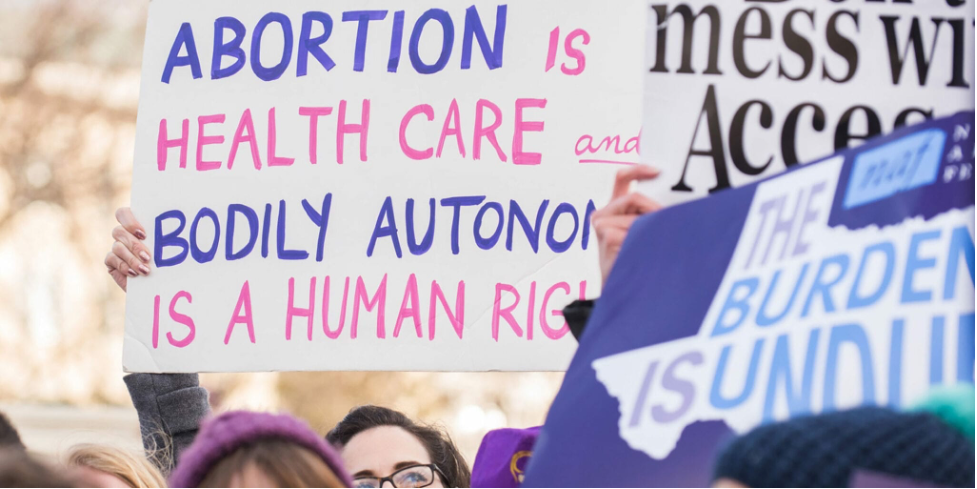
Image Source: Center for Reproductive Rights
When I first heard about Roe v. Wade being overturned, I was overcome with many emotions.
I thought of the students I have taught.
The students I will be teaching this upcoming fall.
And students who I can’t teach because they’re in states where sex education is restricted.
I felt rage.
Hurt.
And hope.
Amidst the hopelessness of this situation, we saw a surge of community support. Abortion funds were being announced, transportation services were being offered, and sanctuary states announced they would allow folks from other states to travel in. One key piece missing from this abortion conversation is to include the history of reproductive justice.
There has been a long history of reproductive injustices committed against Black, Indigenous, and People of Color (BIPOC) communities – a form of structural violence that has led to these recent tragic events.
At the beginning of the 20th century, the idea of eugenics came about. Starting in 1907, States began allowing the sterilization of populations who were deemed undesirable. A shocking 60,000 forced sterilizations were conducted. From that moment came forth the unimaginable horrors that fell on the BIPOC communities.
During the course of the infamous Tuskegee experiment, 600 Black men were observed for the progression of syphilis. They were not given free healthcare despite promises they would and did not fully know what they were being observed for. What resulted from this horrendous study was the deaths of more than 128 participants, 40 of the spouses contracting syphilis, and 19 children contracting it at birth. The Tuskegee Study demonstrated the negligence of the United States government.
On the East Coast, we hear about the Relf v Weinberger case in 1974. A Black mother unknowingly signed a consent form that permitted the sterilization of her two daughters, who were age 12 and 14 at the time of sterilization. It was then that the court decided that coerced sterilizations crossed a line between bodily autonomy and eugenics. However, there were still no protections for BIPOC.
On the West Coast there is the 1975 case, Madrigal vs Quilligan, in Los Angeles, California. Between the late 1960s and early 1970s, a group of Latina immigrant mothers was coerced into being sterilized at Los Angeles County – University of Southern California Medical Center. Feeling as if nothing could be done, the mothers stayed quiet until a Chicana lawyer took their case. They argued that the Supreme Court Roe v. Wade decision guaranteed their right to birth a child. However, the California federal courts ruled in favor of the hospital.
And 47 years later, Roe was overturned.
More recently, at the Irwin County Detention Center (ICDC) in Georgia, we heard of the forced sterilizations of immigrant women in 2020. Detained immigrants were approached by medical staff, without proper explanation of the procedure they were going to undergo. Again, we see BIPOC, especially women, being targeted solely on the basis of their identity and status. It was motivated by the fact that the staff at ICDC did not want to have any “anchor babies” to keep the women here – an idea that sprouted from the eugenics ideology to not have any undesirables in society.
The foundation that the eugenics laws laid has led to all of these cases of reproductive injustice. And they have not been talked about enough. Structural violence has been committed against BIPOC communities time and time again.
This is why we need to talk about reproductive justice.
In California, students receive sexual health education three times: during 5th or 6th grade, middle school, and high school. Having comprehensive sexual health education helps to lay the foundation for a healthy future. A hopeful future can also include finding method to prevent what has happened to the participants in the Tuskegee studies, the family in Relf, the mothers in Madrigal, and the mothers at the ICDC.
In order to prevent another event where bodily autonomy is taken away, we need to start reviewing what needs to be done. That starts from looking at the past and applying it to our current situation. We have to practice cultural humility and instill that within our children from the start. But we need that knowledge of history, the lessons learned from these moments, and to lean in on the science of today.
Abortion is healthcare. And we need access to abortion are for all.
By Deanna Canales, Associate Project Manager – Intern, for HOP’s series of monthly staff blogs.
Sources:
https://www.washingtonpost.com/history/2022/07/26/tuskegee-syphilis-experiment-50-years/
https://www.history.com/news/the-infamous-40-year-tuskegee-study
https://guides.loc.gov/latinx-civil-rights/madrigal-v-quilligan#s-lib-ctab-24838715-0
https://www.splcenter.org/seeking-justice/case-docket/relf-v-weinberger

So beautifully written. Thank you Ms. Canales for this piece. Abortion is healthcare. And abortion is equal rights and justice.